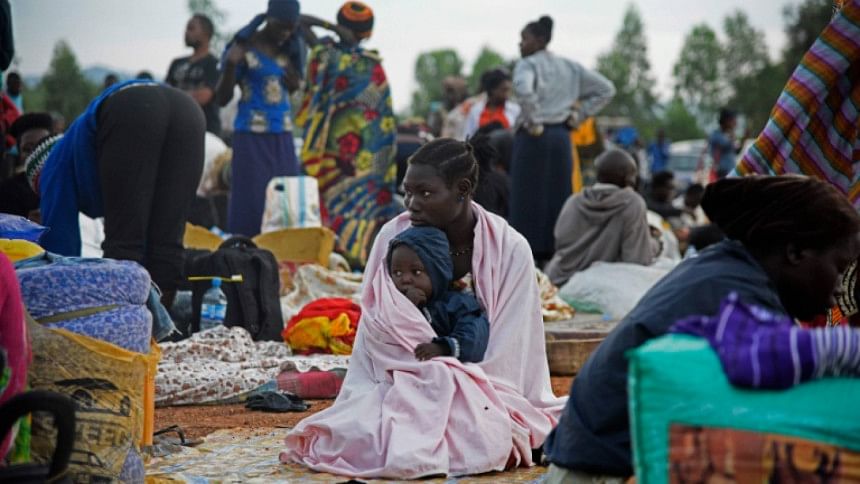Stranded in a foreign land

It is believed that there are more displaced persons in the world today than at any other point in history. According to the UNHCR, there are 68.5 million people around the world who have been forcibly displaced from their home. The UN Refugee Agency goes on to state: Among them are nearly 25.4 million refugees, over half of whom are under the age of 18. There are also an estimated 10 million stateless people who have been denied a nationality and access to basic rights such as education, healthcare, employment and freedom of movement…nearly 1 person is forcibly displaced every two seconds as a result of conflict or persecution…"
The war in Syria which is now in its eighth year accounts for a bulk of the refugees—more than five million—followed by Colombians (7.7 million), Afghans (4.7 million), Iraqis (4.2 million) and South Sudanese (3.3 million). Rohingya refugees worldwide amount to more than a million (it's hard to come by a reliable estimate of the actual number), an overwhelming majority of whom have sought shelter in Bangladesh, and more than two million Yemeni refugees have fled their homes. The number of Palestinian refugees is also one of the largest in the world due to the longstanding history of their ethnic dispossession and expulsion. The civil war in South Sudan became the biggest factor in 2016 when more than 700,000 people fled the world's youngest country by the end of 2016. This list is of course not an exhaustive one—it only aims to provide a cursory glance at some of the most alarming refugee and displacement crises the world is facing right now, with no solutions in sight.
As another World Refugee Day comes and goes and we pause to reflect why, despite reaching unprecedented heights in science and technology, humankind still hasn't figured out how to bring an end to endless war and violence, it becomes clear that it is the game of geopolitics of oil and regional hegemony, and discrimination and persecution based on ethnicity, race and religion, that always jeopardise the livelihoods of a people who once had a home to live in and food on their table. We see the lives of millions uprooted in the blink of an eye as world leaders continue to quarrel amongst themselves and shift alliances giving little thought to the rehabilitation of the displaced. As if having their lives destroyed wasn't enough, these people are then further dehumanised by people in countries that refuse to let them in for fear of the unknown.
Speaking of rehabilitation and sheltering the displaced, there's an asymmetry between countries hosting refugees that is now hard to ignore. Although for the last couple of years, there has been quite a lot of news coverage on developed countries, especially the US and European countries, coming forward to take in refugees (albeit offering to host a miniscule number relative to their capacity), it is clear that developing countries are far ahead when it comes to lending a helping hand to refugees. This asymmetry in sharing the burden, which is sometimes conveniently swept under the rug, is something that should be constantly highlighted in the media and in national conversations. According to a UNHCR study, for instance, "most of the 3.2 million who were driven from their homes in the first half of 2016 found shelter in low- or middle-income countries." People from South Sudan have mostly fled to Sudan, Uganda, Kenya and the Democratic Republic of the Congo. Turkey hosts the largest number of refugees, at nearly three million, followed by Pakistan (1.4 million) and Lebanon (one million). What this illustrates is just how severely neighbouring countries are affected by war and displacement happening next door and the "proximity of many poor countries to regions of conflict." According to the UNCHR's Global Trends report that came out last year, "worldwide, most refugees—84 percent—were in developing or middle-income countries at the end of 2016, with one in every three (4.9 million people) being hosted by the world's least developed countries." But even as these countries open their doors to a growing number of refugees, the fact is that their being resource-strapped means they can only do so much to provide decent conditions and basic facilities. This is something that Bangladesh, now hosting more than a million Rohingyas who have fled Myanmar to escape the latter's longstanding campaign of ethnic cleansing, is already experiencing. This is in addition to the previous waves of migration into Bangladesh in 1978 and 1991-92 although the massive influx last year was by far the largest one.
The rise in far-right populism that we have seen sweep across Europe in the past few years has only worsened the plight of refugees. By October 2017, "there were right-wing nationalist members of parliament in 24 European countries" (PBS, January 22). From Germany, Hungary and Poland to the UK and the US, fears of immigration—fuelled by either domestic economic conditions or nativist rhetoric by far-right groups or a combination of both—have taken a stronghold. And so, at a time when the world is witnessing the highest levels of displacement, more and more border fences are going up and talks about building walls are resonating with an increasing number of people. This is not a good sign for the fate of the millions (nearly half of all refugees are children) whose lives have been destroyed through no fault of their own. There is a clear lack of willingness on the part of countries that can play their due role—and many times that are even responsible for the plight of the displaced—to take back or give refuge to these people with nowhere to go. And time and again, foreign policy and realpolitik have continued to take precedence over human lives.
Nahela Nowshin is a member of the editorial team at The Daily Star.





Comments